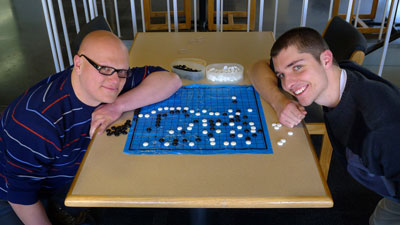They always win at this game
Student-teacher combination developed winning strategy for game of antonim
February 26, 2015
By Mike Killeen

Robert Campbell (left), assistant professor of mathematics and senior Zach Silbernick play a game of Go in the lobby of the Henrita Academic Building at CSB.
Don't — repeat don't — try to play a game of antonim with Zach Silbernick.
You'll lose. Every single time.
You see, the Saint John's University senior and mathematics major completed research with Assistant Professor of Mathematics Robert Campbell during the summer of 2013 on developing a winning strategy for the game of antonim.
Count his friends in the dorm who are on to Silbernick.
"We've played it a few times, but since I can always win, they're not too happy," Silbernick said, smiling. "But they are happy when I show them some of the winning strategies."
Antonim is a variant of nim, a mathematical game of strategy. In nim, two players take turns removing objects from groups known as heaps. On each turn, a player must take at least one object from any one heap. The goal is to take the last object remaining from any heap.
"Nim, we would say, is completely solved (mathematically)," Campbell said. "A winning strategy is understood."
Antonim is similar to nim, but there is an additional rule - no two heaps can have the same number of objects, other than zero.
"Antonim was (solved for) two heaps or three heaps, but other than that it was unsolved," Campbell said. "Our (research) goal for the summer was to have a winning strategy for four heaps. That was our goal from the get-go."
Actually, Silbernick's goal was initially to avoid having to work in a factory over the summer.
"I had Robert at the beginning of fall semester of my sophomore year," Silbernick said. "He was getting to know me, and I told him the summer previously I spent working at a place called Roma where you basically cut cheese. And, he was like, 'That's not really using your math knowledge at all.' Later, I had him for the second semester, and he had talked about the possibility of doing research. I was like, 'I might as well,' because you can use that math knowledge in that research.
"What appealed to me? I mean, it was games," Silbernick said, laughing. "I was trying to tell my family, and they were like, 'Your job for the summer is to play games?' That was amazing. Instead of having to take a whole summer off from math, I got to continue to learn different ways of proving stuff and to think mathematically through the summer. That was a great experience."
Silbernick and Campbell became somewhat joined at the hip. They had discussions on their research almost daily in Campbell's office in the Henrita Academic Building at CSB. "We really created a good bond together. My colleagues kind of described it as kind of being like brothers," Campbell said.
Their research reached an epiphany. "Zach had some ideas about a winning strategy, but none were actually working out," Campbell said. "On one particular occasion, Zach's idea did not work out, but it had the germ of the right idea. I told Zach to focus on that.
"The next meeting, (Zach) said, 'I think I have something.' And, he did. He had the idea," Campbell said. "It's not only for four heaps, but the whole darn problem. He had everything."
Silbernick attended the 2013 Mathematical Association of America's MathFest July 31-Aug. 3 in Hartford, Connecticut, and presented their research.
"They said I gave a good presentation," he said. "They said it was good research. There were no holes in the research. It was really an amazing experience, going to Connecticut and meeting all these mathematicians."
Silbernick's research was submitted to the Journal of Recreational Mathematics in the fall 2014 (he's still waiting to hear if it will be published). He also was one of four CSB and SJU students who presented their research at the Pi Mu Epsilon Conference in April 2014 at SJU.
The native of Royalton, Minnesota, said he wouldn't have been able to accomplish this without the help of the mathematics department.
"When I first came to college as a mathematician, all I cared about was the answer," Silbernick said. "They've shown me that it is so much more than the answers. It's the process of going about solving problems."
"He's a phenomenal student; he's one of our top teacher's assistants; he is a very active member of our department; he works as an officer in our math society," Campbell said. "I feel like he really embodies the Benedictine values greatly. He seems very friendly and welcoming. Every time I have someone in my office, he loves stopping by and getting to know another one of the students."
Just don't play antonim with him.
